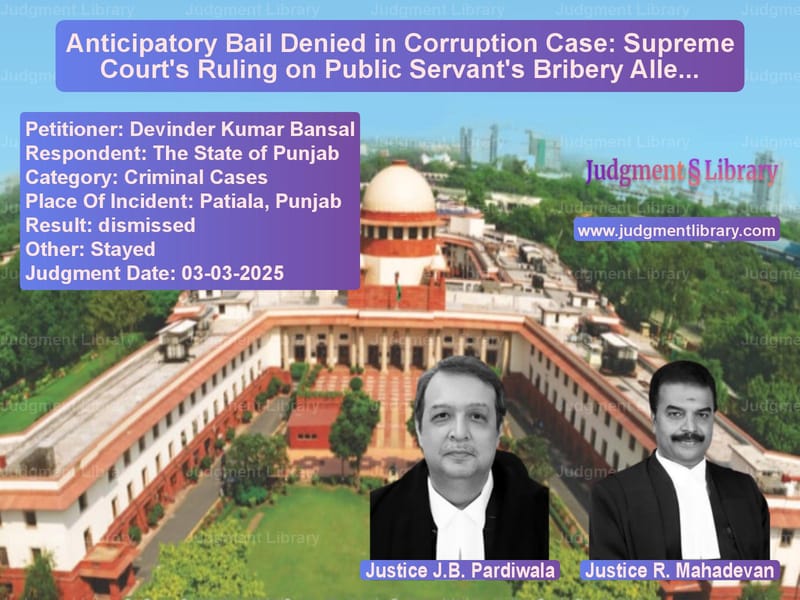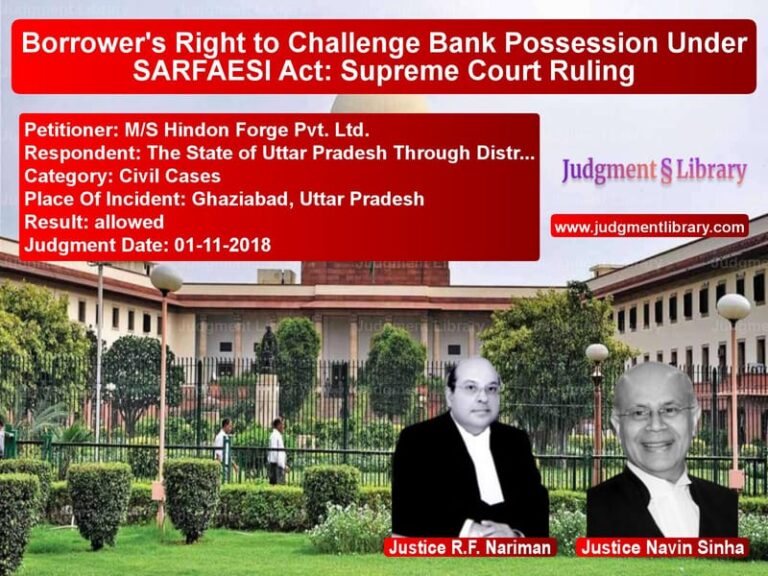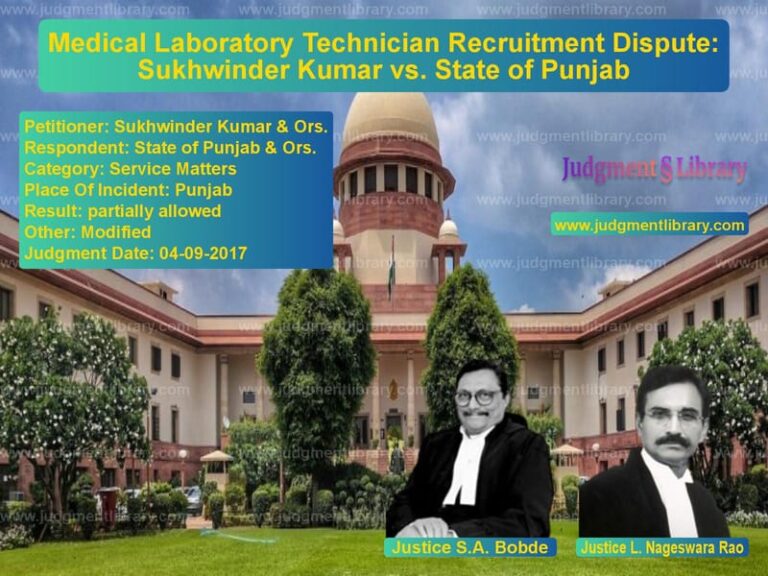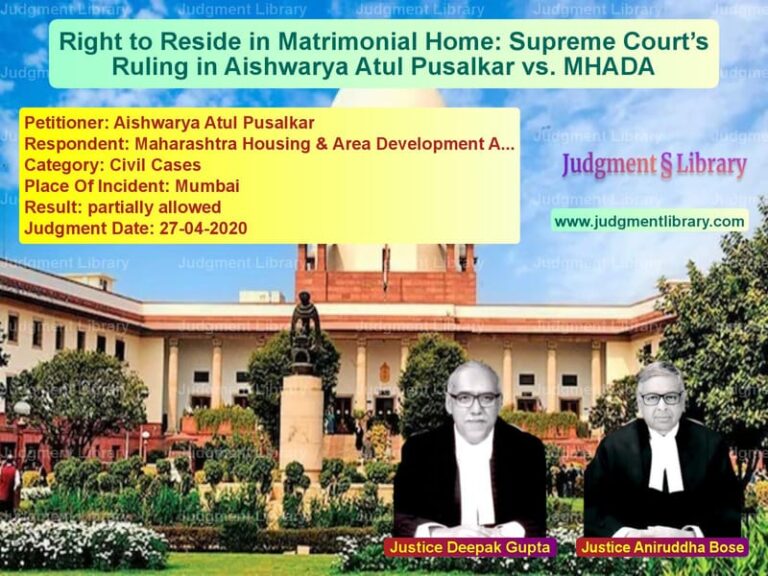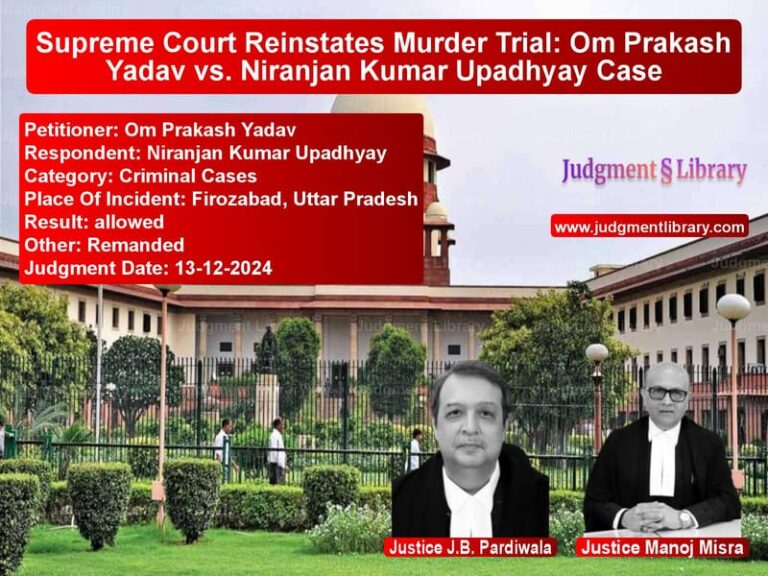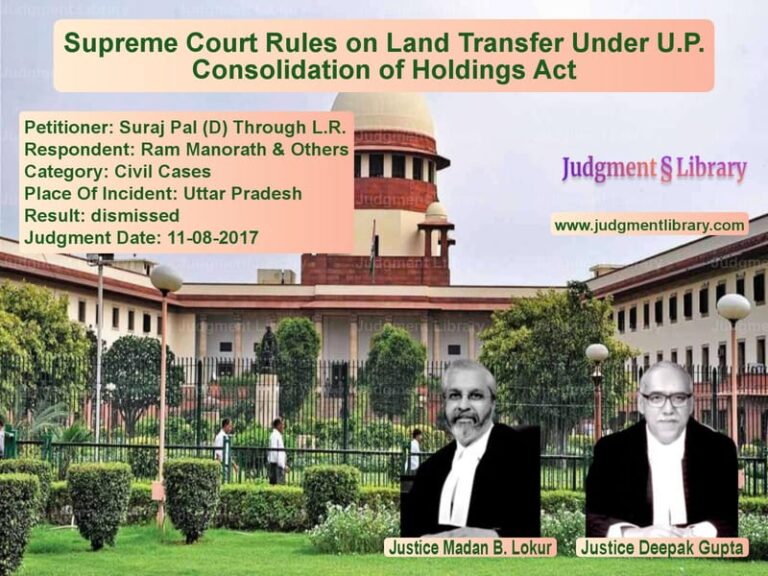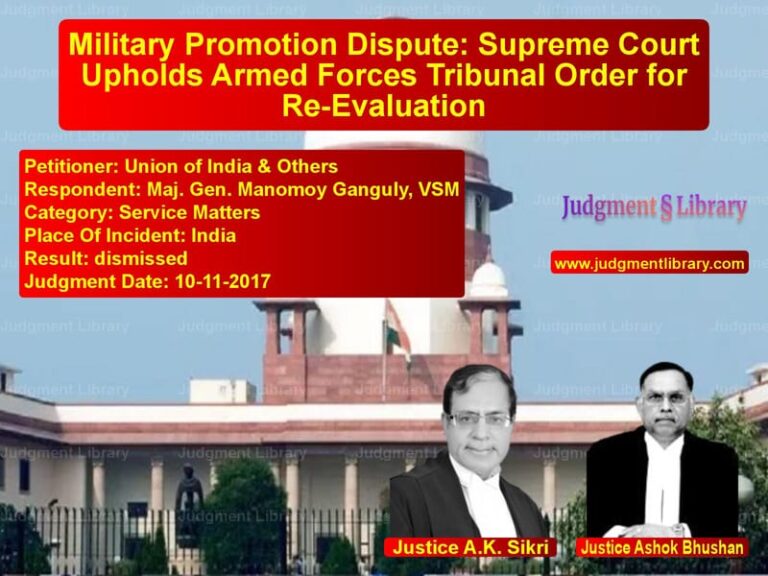Anticipatory Bail Denied in Corruption Case: Supreme Court’s Ruling on Public Servant’s Bribery Allegations
The Supreme Court of India recently delivered a crucial ruling in Devinder Kumar Bansal v. The State of Punjab, where it denied anticipatory bail to the petitioner, an audit inspector accused of corruption under Section 7 of the Prevention of Corruption Act, 1988, and Section 61(2) of the Bharatiya Nyaya Sanhita, 2023. The case sheds light on the strict stance of the judiciary against corruption and the rigorous scrutiny required for granting anticipatory bail in cases involving public officials.
Background of the Case
The case originated from an FIR registered on January 8, 2025, at the Vigilance Bureau, Patiala, Punjab. The petitioner, Devinder Kumar Bansal, was serving as an Audit Inspector in the state government and was accused of demanding illegal gratification in connection with an audit related to development works conducted during the tenure of the complainant’s wife as the Sarpanch of a Gram Panchayat.
According to the prosecution, the co-accused, Prithvi Singh, was caught red-handed accepting the bribe on behalf of the petitioner. Additionally, an audio recording from January 8, 2025, allegedly contained the petitioner’s voice confirming the receipt of the bribe and instructing its further transfer.
Petitioner’s Arguments
The petitioner, through his counsel, presented the following arguments in favor of granting anticipatory bail:
- The case against him was weak, and he was being falsely implicated.
- There was no direct evidence linking him to the acceptance of the bribe.
- The audio recording relied upon by the prosecution required forensic examination to establish its authenticity.
- The High Court had wrongly denied him anticipatory bail without considering the principles of Article 21 of the Constitution, which guarantees personal liberty.
Respondent’s Arguments
The prosecution, represented by the State of Punjab, opposed the anticipatory bail on the following grounds:
- The co-accused, Prithvi Singh, was caught in a trap operation while accepting the bribe and had confessed that he was acting on behalf of the petitioner.
- The petitioner’s voice was clearly audible in the audio recording, where he confirmed the receipt of the bribe and instructed its transfer to another individual.
- Corruption by public servants is a serious offense, and anticipatory bail should not be granted in such cases unless exceptional circumstances exist.
- Investigative agencies required custodial interrogation to extract further evidence regarding the money trail and potential involvement of other officials.
Supreme Court’s Analysis
The Supreme Court, while rejecting the plea for anticipatory bail, relied on legal precedents and statutory provisions under the Prevention of Corruption Act.
Key Legal Provisions Examined
- Section 7 of the Prevention of Corruption Act, 1988: Deals with public servants accepting illegal gratification apart from their lawful remuneration.
- Section 13(1)(a) of the Prevention of Corruption Act: Addresses criminal misconduct by public servants who habitually accept bribes.
- Article 21 of the Constitution: While protecting personal liberty, it does not extend to shielding individuals from legitimate criminal investigations, particularly in corruption cases.
Key Observations from the Judgment
“The presumption of innocence, by itself, cannot be the sole consideration for granting anticipatory bail. The courts must balance the rights of the accused with the greater public interest in combating corruption.”
“Where overwhelming considerations of public interest demand denial of anticipatory bail, the courts must not hesitate to deny liberty to an accused.”
Why Anticipatory Bail Was Denied
- The Court emphasized that anticipatory bail is granted only in exceptional circumstances where the accused is falsely implicated or the allegations are frivolous.
- The presence of strong prima facie evidence against the petitioner—including the trap operation, co-accused’s confession, and audio recording—made it imperative to deny anticipatory bail.
- The Court noted that custodial interrogation was necessary to determine the full extent of the corruption and trace the flow of bribe money.
- It was held that the petitioner’s liberty must be weighed against the need to ensure a corruption-free governance system.
Legal Precedents Cited
The Supreme Court relied on several past rulings to reinforce its decision:
- CBI v. V. Vijay Sai Reddy (2013) 7 SCC 452: Bail should not be granted when it affects the larger public interest.
- State of M.P. v. Ram Krishna Balothia (1995) AIR SC 1198: Anticipatory bail is not a fundamental right under Article 21 and should be exercised cautiously.
- Subramanian Swamy v. Manmohan Singh (2012) 3 SCC 64: Corruption is a threat to democratic governance and must be tackled with strict legal measures.
- K.C. Sareen v. CBI (2001) 6 SCC 584: Corrupt public servants paralyze institutions and must face stringent legal consequences.
Final Judgment
The Supreme Court, in its ruling, stated:
“The petition is accordingly dismissed. However, if the petitioner applies for regular bail after arrest, it shall be considered on its own merits without being influenced by this order.”
Implications of the Judgment
- Stringent Approach to Corruption: This ruling reinforces the judiciary’s commitment to combating corruption and ensuring accountability among public servants.
- Increased Scrutiny in Bail Matters: Courts will continue applying strict standards when deciding anticipatory bail pleas in corruption cases.
- Significance of Evidence: The decision highlights that direct and circumstantial evidence, including audio recordings and trap operations, play a crucial role in denying pre-trial relief.
- Public Interest Consideration: The Court reaffirmed that the interest of the state and society at large outweighs individual liberty in cases involving corruption.
Conclusion
The Supreme Court’s ruling in this case sets a powerful precedent in dealing with corruption allegations against public officials. It highlights the judiciary’s resolve to curb corruption by ensuring that those accused of bribery and misuse of office face thorough investigations before any relief is granted. The judgment serves as a cautionary tale for public servants and reinforces the need for transparency and accountability in governance.
Petitioner Name: Devinder Kumar Bansal.Respondent Name: The State of Punjab.Judgment By: Justice J.B. Pardiwala, Justice R. Mahadevan.Place Of Incident: Patiala, Punjab.Judgment Date: 03-03-2025.
Don’t miss out on the full details! Download the complete judgment in PDF format below and gain valuable insights instantly!
Download Judgment: devinder-kumar-bansa-vs-the-state-of-punjab-supreme-court-of-india-judgment-dated-03-03-2025.pdf
Directly Download Judgment: Directly download this Judgment
See all petitions in Bail and Anticipatory Bail
See all petitions in Fraud and Forgery
See all petitions in Money Laundering Cases
See all petitions in Judgment by J.B. Pardiwala
See all petitions in Judgment by R. Mahadevan
See all petitions in dismissed
See all petitions in Stayed
See all petitions in supreme court of India judgments March 2025
See all petitions in 2025 judgments
See all posts in Criminal Cases Category
See all allowed petitions in Criminal Cases Category
See all Dismissed petitions in Criminal Cases Category
See all partially allowed petitions in Criminal Cases Category

